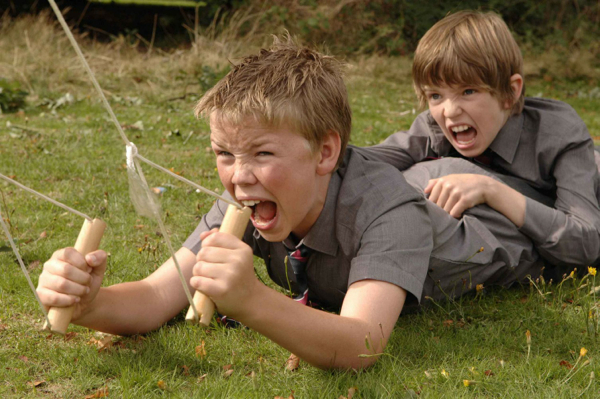Movie review by Greg Carlson
A largely winning and occasionally beguiling friendship yarn from moviemaking team Hammer & Tongs, “Son of Rambow” applies liberal doses of British eccentricity and charm as it crafts the story of two unlikely pals who forge a creative moviemaking partnership. While it certainly cannot hold a candle to “Rushmore,” “Son of Rambow” respectfully takes up with its nearly adolescent protagonists after the fashion of Wes Anderson’s contemporary classic, allowing the audience to relate to these kids from the inside out. Viewers who give in to the movie’s imaginative tone will be transported to the emotional heart of childhood, a time when fantasy and escapism counteract the indignities of having little control over one’s own daily life.
“Son of Rambow” fires up an opposites attract dynamic in its opening scenes, introducing viewers to Will Proudfoot (Bill Milner), a rail-thin elf protesting the sins of cinema with his religious clan, and Lee Carter (Will Poulter), a scruffy rebel who happens to be pirating the goods with a bulky camcorder in the smoking balcony. The film in question is Ted Kotcheff’s “First Blood,” and it ends up becoming a key ingredient in the oddball collaborative relationship that will form between Will and Lee. Will is forbidden by his family to watch movies, but once he sneaks a peek at Sylvester Stallone’s heroic killing machine, all bets are off as he is seized by production fever.
Both boys are fatherless to some degree, and when he is not illegally taping movies, Lee dreams of winning a BBC-sponsored moviemaking competition. After establishing the unlikely partnership between Will and Lee, the film’s script makes certain that their skills are much stronger when working together. The arrival of an outsider, humorously embodied by a tragically hip French exchange student named Didier (Jules Sitruk), threatens both friendship and production. The movie within the movie provides many opportunities for self-referential comedy (not unlike Max Fischer’s elaborately staged dramas in “Rushmore”), and is one of the chief pleasures of “Son of Rambow.”
Writer-director Garth Jennings, who forms Hammer & Tongs with producer Nick Goldsmith, apparently based some of the crude moviemaking experiments of the main characters on his own exploits. He previously helmed the execrable big budget adaptation of “The Hitchhiker’s Guide to the Galaxy,” and while that film had its supporters, “Son of Rambow” is a much stronger piece of moviemaking in every way, despite the colossally different price tags. The quaint stereotypes might be a bit broad, but the intimacy of the village and school are preferable to the vastness of giant studio sets.
“Son of Rambow” exuberantly identifies with the thrill of childhood imagination, which knows zero limits. Will illustrates the margins of his books and a bathroom stall with detail-rich landscapes reminiscent of Henry Darger’s intricate scrolls. The movie often asks the audience to suspend its disbelief, as the boys arrange shots for their movie that end with gravity-defying catapults and other dangerous stunts. It asks again when the entire school caste system is inverted by filmmaking delirium that turns the nerds into the cool kids. “Son of Rambow” errs too often on the side of sentimentality, but for anyone who has ever been gripped by the desire to make a movie, it reflects familiar emotions.
